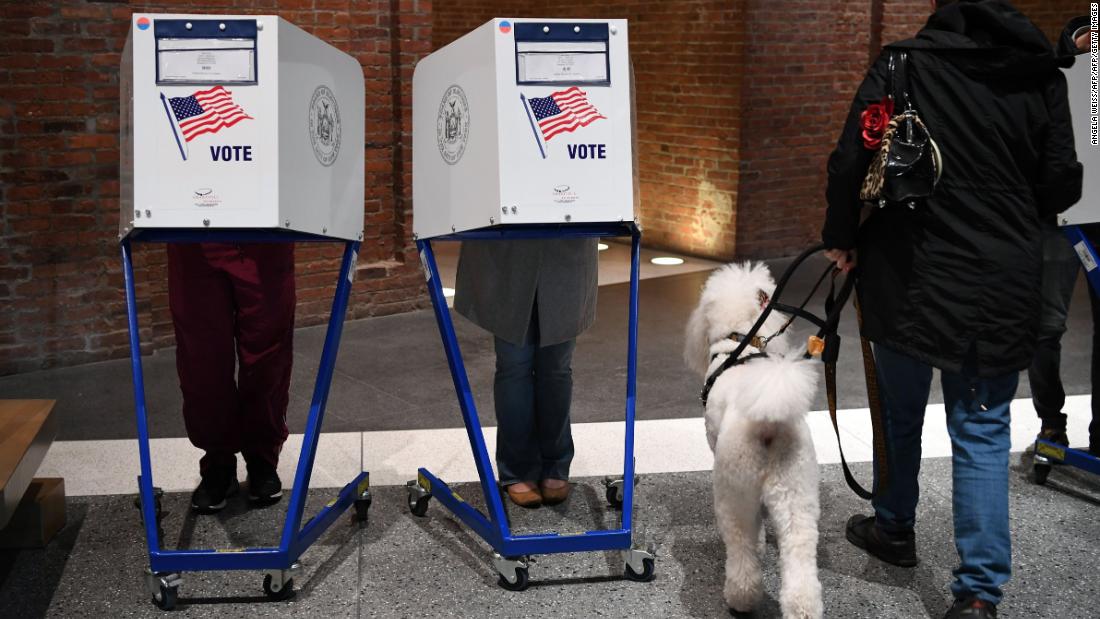
(CNN)A federal court's rejection of North Carolina's GOP-rigged congressional district map has thrown in doubt 13 voting districts just months before the November midterm elections, along with prospects for the Republican and Democratic parties in the state and perhaps even the full US House of Representatives.
But one thing was clear: The judges who declared the state's partisan gerrymander unconstitutional on Monday adopted the roadmap of liberal Supreme Court justices over the sentiment of conservatives in the high court's recent political redistricting battle.
The special three-judge panel's reliance on an opinion by Justice Elena Kagan -- which Chief Justice John Roberts had tried to undercut in the case last June -- represents a victory for challengers to partisan gerrymanders.
It could embolden other judges who increasingly confront maps that were produced by sophisticated software and voter patterns to ensure that a single party prevails and election outcomes are essentially a foregone conclusion.
For now, however, Monday's ruling adds a new level of chaos to a state already embroiled in ballot and election litigation. The fate of the North Carolina's map and timing of its midterms is still to be determined by continuing litigation in upcoming weeks. The case could scramble the House battleground map, in which Democrats need a net gain of 23 seats to take control.
Such a late shake-up would lead to a new round of recruiting efforts, potential retirements and expensive races, just as this year's primaries conclude and both parties believed they were finally getting a full picture of the playing field.
Republican and Democratic campaign officials said their lawyers are still analyzing the ruling and considering their next steps.
"I'm shocked by the timing, given that it's less than three months until the election and given this is an unsettled area of the law," said Art Pope, a major North Carolina GOP donor and powerbroker.
If the court eventually orders new districts drawn before the November election, Pope would "imagine there would be massive lawsuits throughout the country ... you would end up having federal courts draw the districts for 2020. That's why I don't think SCOTUS will uphold the Fourth Circuit's opinion"
Asked about the possibility raised in the decision of a November primary with the new map, followed by a January special, Pope speculated the level of interest and spending could be historic.
"The amount of money if you have a special election in an entire state? It'd probably be the most expensive 13 congressional district elections in the history of the country," Pope said.
Because of ongoing litigation in an unrelated election case, the state had been holding off finalizing ballots for the November 6 midterms. Now the chance exists that the state might have to hasten to produce a new district map. In the Monday ruling, US Appeals Court Judge James Wynn raised several possibilities, including a new redistricting plan and delay in a general election date. He asked the parties to file briefs related to options by 5 p.m. Friday.
In the meantime, North Carolina state officials could ask the US Supreme Court to block the effect of Monday's decision so that the current redistricting plan can be validly used through 2018. With last month's retirement of Justice Anthony Kennedy, the high court currently has only eight members, ideologically divided with four conservative justices and four liberals. Five votes are needed to block a lower court ruling.
Senate hearings for President Donald Trump's nominee to succeed Kennedy, US Appeals Court Judge Brett Kavanaugh, are scheduled to begin on September 4. If he wins Senate confirmation, he is likely to be sworn in as the ninth justice in late September or early October.
Legal controversy over gerrymandering
The lower court panel that ruled Monday had previously declared the map an unconstitutional partisan gerrymander. (An earlier iteration of the congressional districts had been struck down as a racial gerrymander.) In June, the Supreme Court ordered the three-judge panel to reconsider its partisan gerrymander decision based on its ruling in a Wisconsin case that the challengers had lacked legal "standing" to sue because they had not demonstrated sufficient harm.
That ruling was unanimous, but four justices, led by Kagan, split off to offer a blueprint for challengers to show that voting power was diluted in individual districts or mount a statewide claim based on a First Amendment right of free association. In an unusual move, Chief Justice Roberts suggested her concurring opinion should be disregarded. He said the court's ruling was set forth in his opinion "and none other."
Roberts has made clear that he believes that judges should not take up such cases. He has said that if judges intervened to find that partisan gerrymander had gone too far to infringe on constitutional rights, siding with either Democrats or Republicans, people would view courts as simply favoring one party over another.
But Kagan stressed the "evils of gerrymandering," as did Monday's court, which it found violations based on the constitutional guarantee of equal protection and rights of free speech and association. The appeals court said that the Republican-controlled North Carolina assembly relied on data from past elections showing how particular precincts had voted to "to draw a districting plan that would ensure Republican candidates would prevail in the vast majority of the State's congressional districts and would do so in future elections."
"Put differently," Wynn wrote, invoking Kagan phrasing, "the General Assembly's Republican majority decided which ideas would prevail in the state's congressional elections. In doing so, they deprived Democratic voters of their natural political strength by making it difficult for such voters to raise money, attract strong candidates, and motivate fellow party members and independent voters to campaign and vote."
Rather than stay out of such cases, the lower court declared, judges might offer the only place to safeguard constitutional rights. "Indeed, the need for judicial review is at its most urgent in such cases," Wynn wrote, "for here, politicians' incentives conflict with voters' interests, leaving citizens without any political remedy for their constitutional harms."
Original Article : HERE ; This post was curated & posted using : RealSpecific
=>
***********************************************
See More Here: North Carolina gerrymandering: Judges back Kagan interpretation and could decide balance of power in House
************************************
=>
North Carolina gerrymandering: Judges back Kagan interpretation and could decide balance of power in House was originally posted by Monthly Mashed 3


No comments:
Post a Comment